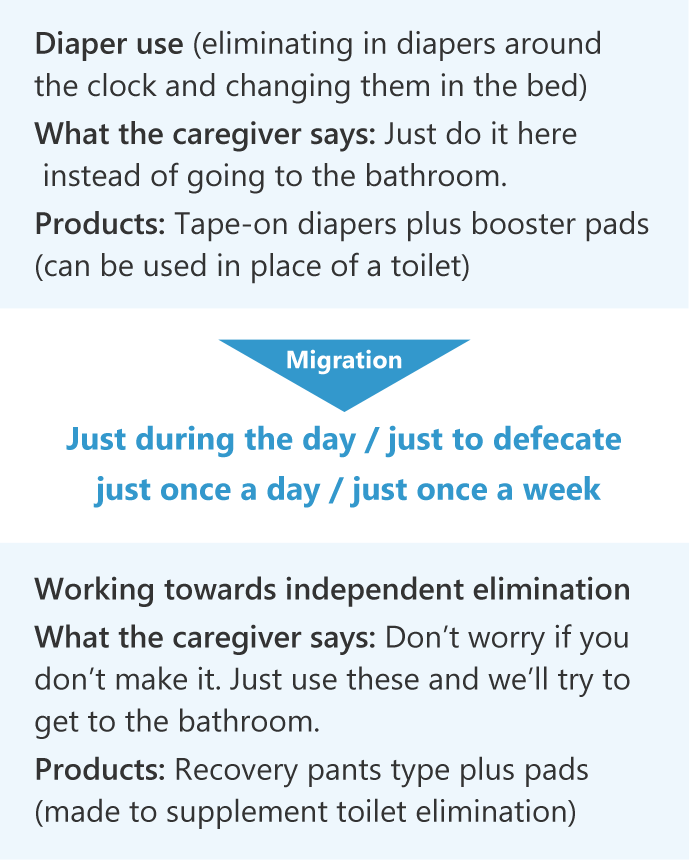Unicharm Incontinence Care Lab Research Center
 Caregiving/recovery for those who can sit up and stand
Caregiving/recovery for those who can sit up and stand
The important thing in everyday recovery activities at home is getting the person to regain their fundamental life functions. For this reason, daily incontinence care plays a critical role.
Pants type support independent elimination
The Unicharm Incontinence Care Lab recommends pants type rather than tape-on diapers for at-home urinary and bowel care. Rather than have people stay in a tape-on diaper all day long, it’s better for them to use the toilet at least sometimes, even if it’s just during the day, only to defecate, or only once out of every ten times. Our disposable pants type and pull-up booster pads can be used during the recovery process to try to get to the bathroom without worrying about accidents, and with positive guidance towards the toilet as the goal. If the person can make it to the bathroom, it will greatly expand their life and activities. Wearing pants type is a major step towards independent elimination in the bathroom, and can give both caregivers and their loved ones the courage to return to regular life and participate in the community.
The first step towards returning to regular life (switching from diapers to pants type)

Why using the toilet matters
Do you think of the bathroom only as a place to eliminate? For me, the bathroom is also a place to change out pads or clean up and dispose of whatever the body has eliminated. Even if the person you are caring for can’t sit on the toilet and eliminate, they can still, with the caregiver’s help, sit there while you change out their pad or help them get into a new pull-up. This still counts as “using the bathroom”.
When people can use the bathroom, they can get out of the house and interact with people, which motivates them to participate in the community and aspire to something more. It’s also considered that sitting on a toilet is the ideal position for getting the body to eliminate.
Because this position facilitates bowel movements, it can help those who struggle with defecation issues to regain more normal bowel functioning.
In this way, “using the toilet” is meaningful from a social and psychological perspective as well as a physical one.

Keep an elimination diary
I recommend that people who are helping loved ones eliminate at home keep an elimination diary with details about when pads needed to be changed, when they defecated, what the stool was like, and so on. This will give you an idea of when you need to help the person to the toilet and which pads are best for their needs.
If you also carefully observe the person’s movements and facial expressions, you should be able to identify signs indicating that they are feeling the need to urinate or defecate.
As you keep an elimination diary and start effectively leading the person to the toilet, you will gradually increase the number of successful eliminations, giving confidence to both the caregiver and the person being cared for. This will play a major role in developing the habit of independent elimination in the bathroom.
Unicharm Incontinence Care Lab
This facility studies incontinence treatments at facilities and clinics nationwide in order to advocate toilet guidance and independent elimination support through the use of recovery pants type. We also engage in practical activities that put incontinence care theories into practice from a variety of angles.
Get advice from nursing care and recovery experts








